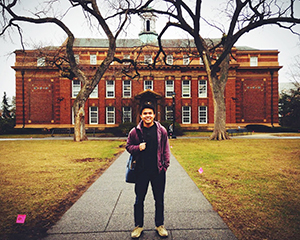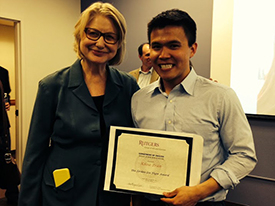Balancing Literature and Medicine, a Rutgers Graduate Finds a Healing Combination
Stethoscope, tongue depressor, and . . . novels?

'Narrative medicine is an introspective approach that adds to the scientific model by emphasizing listening to and understanding the stories patients tell.'- Khoa Tran
His destiny seemed certain. Khoa Tran would be a great literary scholar.
As a Rutgers undergraduate, Tran, a Vietnam native, impressed his professors with his flair for literary theory and his facility with challenging material, such as the work of philosopher and social critic Michel Foucault.
“I love theory and criticism,” said Tran, who graduated from the School of Arts and Sciences in 2014 with a bachelor’s degree in English. “When I noticed I was reading this stuff on buses and in coffee shops, I knew I was hooked.”
But this fall, Tran has taken a very different path. He’s attending Rutgers New Jersey Medical School, studying to become a doctor.
As he begins the eight-year odyssey of medical studies and residency, however, Tran’s love for literature continues to play a central role in his life. And it may even end up shaping his approach to medicine.
Initially torn between medical school and graduate studies in English, Tran chose medicine after discovering the emerging narrative medicine movement, which stresses the role of listening, interpreting, and reflecting in the relationships between doctor and patient. Tran met personally during his senior year with Rita Charon, who runs the program in narrative medicine at Columbia University’s College of Physicians and Surgeons.
“Doctors have a very systematic way of working and they’re obviously trained in scientific objectivity,” Tran said. “Narrative medicine is an introspective approach that adds to the scientific model by emphasizing listening to and understanding the stories patients tell.”
Tran knows firsthand about such stories. He grew up in a family scarred by the Vietnam War.
His father served in the South Vietnamese military and was imprisoned for seven years following the fall of Saigon. The family left Vietnam when Tran was five, eventually settling in Atlantic City.
Throughout his childhood, Tran accompanied his ailing father to medical appointments where he would often serve as translator.
“Seeing the empathy the doctors displayed for my parents hit a soft spot in me,” he said. “That’s the image of what I wanted to be. I wanted to give that same sort of empathy.”
In an era when the humanities and the sciences are increasingly perceived as separate intellectual silos, Tran might seem unusual for his commitment to bringing them together. But he has plenty of company at Rutgers, which recently integrated most of the former University of Medicine and Dentistry of New Jersey.
Ann Jurecic, an English professor and author of Illness as Narrative, is among a small group of faculty and students at SAS and the Robert Wood Johnson Medical School who have discussed ways to collaborate.

“There is a lot of interest among students and faculty to bridge the gap between the main campus and the medical schools,” Jurecic said. “People want to think together about what’s possible.”
Meanwhile, some Rutgers graduates who’ve gone on to medical school are actively working to build literary communities among their fellow aspiring physicians. Zeynep Uzumcu, Class of 2011, and a second-year RWJMS student is collaborating with her peers to create a literary magazine, a writing workshop, and a book club.
“As medical students, the most important thing we learn is how to be patient-centered,” Uzumcu said. “But in order for us to be in patient-centered, we have to stay connected to what makes us human. For me, that’s the essence of medical humanities.”
Daniel Marchalik, a Rutgers and RWJMS graduate, is teaching a medicine and literature course at Georgetown University School of Medicine.
“Talking about books, discussing actual stories makes the mind more pliable and receptive,” says Marchalik, a surgical resident at Georgetown University Hospital. “As a result, students are better listeners; they’re better able to listen to their patients and empathize with patients’ lives.”
For Tran, who minored in biology, Rutgers and SAS always offered a reassuring ethos - a place where many students are double majors, and where cross-disciplinary work is highly valued.
“Here I was taking these esoteric literary theory courses and then going off to biology lab,” he said. “Sometimes I wondered how it would all fit. But everyone was so encouraging.”
His professors recall a student that stood out–for his intellectual abilities, and for his extraordinary personal warmth.
“He’d raise his hand in class when we discussed a reading and he’d say ‘this moved me,’ or ‘reading this changed my life,’’ recalls Ann Coiro, who had Tran in her Milton class. “There was a sweetness and openness to him that was really special.”
Tran is particularly excited to be attending the New Jersey Medical School, partly because of its Newark location, and also because of the school’s Healthcare Foundation Center for Humanism and Medicine. The center’s mission is to “foster the ideals of respect and dignity for the individual as we provide service committed to relieving suffering with kindness, justice and humility.”
Tran aims to practice medicine in urban settings, and is gravitating toward family or emergency medicine.
“I certainly see myself working in a place where there are a lot of needs,” he says. “I enjoy the closeness and personal interaction of family medicine.”